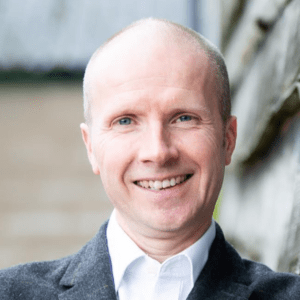
Ian Luckett from ‘IT Experts’. Ian is a multi-talented IT & MSP business growth expert with over 20 years’ experience as a mentor, coach and ebusiness strategist. Over the years of working at various blue-chip companies holding a variety of senior positions, no one fits the profile better than Ian to help you build a profitable IT & MSP business by increasing your sales, productivity and profits.
Connect with Ian on LinkedIn.
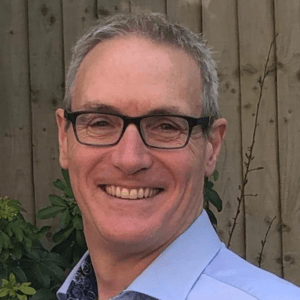
Stuart Warwick from Scale With Confidence and the MSP mastery. Stuart is an MSP specific business coach, creator of the Scale With Confidence Model and founder of the MSP Mastery programme designed to help MSP’s scale with confidence to £1million or, if already there, to go faster.
Connect with Stuart on LinkedIn.
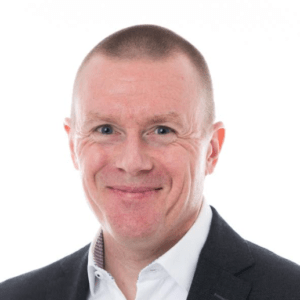
Daniel Welling from WellingMSP. Daniel started his career in IT in 1995, following a sales track, working for a number of VARs and quickly developing a consultative approach to new business and account management, leading to Sales Management within a few years. In 2019, Daniel co-rebooted the London SBSC monthly meet up for MSPs whilst continuing participation in groups such as CompTIA. In 2020 Daniel was elected to the CompTIA Executive Council for the UK Business Technology Community.
Connect with Daniel on LinkedIn.

Fiona Challis from the Next Generation Sales Academy. Fiona is a global MSP sales expert and a highly sought after speaker and trainer on sales transformation, shifting from transactional selling to selling business outcomes, increasing recurring revenue streams and driving predictable and profitable growth.
Connect with Fiona on LinkedIn.
Voiceover:
Fresh every Tuesday for MSPs around the world. This is an MSP marketing podcast special.
Paul Green:
Well, I hope you had a great Christmas and you are enjoying that in-between week. It’s always a good chance to take some time off. Reflect and think about what do you want to achieve with your business next year. Now, a couple of months ago, I went to a real life event. It was a CompTIA event in London, in the UK. And one of the highlights for me was meeting up with a bunch of people that I’ve got to know over the last couple of years, but some of them we never actually met until that event.
Paul Green:
I’m part of a group in the UK called the ITbetweeners or the I-T-betweeners. And we’re a group of people who work exclusively with MSPs, but we are not vendors. And we’re kind of not MSPs either. We are in between and hence the phrase, the ITbetweeners. Now, the members of this group are incredibly switched-on people. They’re all consultants, coaches, they’re people who… Their day-to-day existence is about helping MSPs do better. And so I asked them this question, what do successful MSPs do in order to grow? I think you’ll find some of their answers are utterly mind-opening. They’ll set you up for the things that you want to be doing with your business next year.
Voiceover:
Paul Green’s MSP marketing podcast special.
Paul Green:
Well, this is something very special. I’ve got together some of the greatest minds in MSP growth, and yes, I’m looking at you guys here. We’re here at CompTIA in London back in October. So as you listen to this, it’s a few months on from when we recorded it, and I’ve got together some people who are going to introduce themselves now, and we’re going to answer a very unique question. What do successful MSPs do to grow? So let’s introduce you, first of all, to the person on my right. You are?
Ian Luckett:
Hi, I’m Ian Luckett from IT Experts, helping MSPs grow.
Stuart Warwick:
Hi, Stuart Warwick from Scale with Confidence and the MSP mastery. Taking MSPs to a million, or if they’re already there, to go faster.
Daniel Welling:
Daniel Welling, Welling MSP, mentoring, recruitment, and M&A.
Fiona Challis:
I’m Fiona Challis and I teach them how to sell stuff.
Paul Green:
And do you know what if something happened right now? It’s like all of the coaches in the UK MSP scene are here, this will be a disaster if all of you were taken out right now. So, Stuart, we’re going to start you because you’ve got the nicest voice. Okay? So the question is, what do successful MSPs do? What do they do well? What’s driving them forward?
Stuart Warwick:
If they’re going to scale, and that’s really what growth is all about, it’s about, ultimately, understanding that that’s what they want to do. It’s as simple as that, “Do I want to grow or do I want to stay where I am?” Because if you do, then we need to get you really clear about where… What that looks like. And that seems really a simple thing to say, and that it’s not important, but it is the most powerful piece because then you can harness your team and experts and consultants to help you get there. And it’s as simple as that.
Paul Green:
If I was to play devil’s advocate on that. I’d say surely every MSP wants to grow. So why do you need to know where it is that you want to be?
Stuart Warwick:
Because everyone’s different. I did some research back in 2015 with HMLC stats and SIC codes and 95.7% of MSPs in those SIC codes were under a million, just over 4% were over a million. And so the majority of MSPs don’t get past seven figures. And if you understand business, until you get past six or seven figures, you haven’t really got a business. You’ve got a self-employed lifestyle business, and that’s okay for many people, but some got into this to build something special and they haven’t got there yet. And 96% of them are stuck, if not 50% of that 96%. And that’s why they need to know, “Do I want to grow or do I not want to grow?” Because if you don’t, that’s fine. But if you do, then let’s get on with it.
Paul Green:
That’s just some very specific stats you pulled off the top of your head there.
Stuart Warwick:
I remember doing that research.
Paul Green:
Okay, okay. You remember doing the research? So, Daniel, let’s follow on from that. So when someone’s looking to grow, in your experience, what are the things that they’re looking for? Is it a better lifestyle? Is it a… Is it more money? Is it a better car on the drive?
Daniel Welling:
If we are assuming that the MSP wants more money, wants more time, then the first thing they must do is build a plan and then measure themselves against that plan and have the discipline to behave the way they need to, to execute the plan.
Paul Green:
Give me a specific example of that.
Daniel Welling:
Let’s take delegation, which is the first thing most MSP owners that are growing beyond lifestyle need to tackle. They’ve got to decide what tasks they’re not going to do and they’ve got to delegate them, then help the person they’ve delegated it to, to execute those tasks without their involvement.
Paul Green:
And people find that hard?
Daniel Welling:
Because they do it better than anyone else ever could or ever will, so they’ve got to reconcile the fact that it’s not going to be done to their standards, but the standards are going to be sufficient for them to push on and do the next task that’s more important for them.
Paul Green:
So, Ian Luckett, let me ask you the next part of that, which is how do you overcome that problem when you know that you can do any job in the business better than anyone else, how do you let go of that in your mind?
Ian Luckett:
So, for me, this has got to be around the systems and the processes and understanding not only the technical processes, but also the business processes and having those written down, documented, so anyone can operate it. So you’re going to in… Install your own operating system basically. So, when you’ve got a sales call, make sure that they’ve got the script and they understand what information they’ve got to collect, when you’ve client onboarding, making sure that you’ve got that process down so that anyone can onboard the client. And then when, kind of coining onto what Daniel was saying about understanding that plan, measuring that plan. You then step back while the rest of your business starts to run a little bit more autonomously and you can then measure it and look at it and adjust the plan and focus on that business rather than being in it is a key thing for me.
Stuart Warwick:
Because exactly what Ian’s saying is that then you’ve got the opportunity to build on what you’ve automated or created. And so it’s an incremental compounding thing that, “Let’s start with one thing and get that working better. And then let’s work on the next thing.” And as Daniel said, with the delegating thing, most MSP owners have never learned how to manage, unless they’ve been in a previous business, so they don’t know what they don’t know. And it’s scary. Especially once you get past three or four people, it’s like herding cats. So you kind of get stuck there because you don’t know how to take managing people as one thing to the next step.
Paul Green:
And Fiona, you’re arguably the UK’s most successful sales trainer for MSPs.
Fiona Challis:
Yay!
Paul Green:
That’s an official title now. You can put that on your website. So taking what Stuart said there, do you see that within sales as well, that people have exactly the same problem?
Fiona Challis:
Yes. Yeah. I mean normally for most MSPs, there’s the… It’s the business owner that’s starting to try and do the selling, first of all. And that’s always the challenge because their comfort zone is actually technical. So it’s having focus time outside that comfort zone and actually going into that scary stretch zone, okay? Two hours dedicated to selling or two hours dedicated to sales and marketing today without going back to managing tickets, because the easy thing to do is go back to manage tickets. The hard thing to do, is stay focused and stay focused on selling and that’s what they have to do.
Fiona Challis:
But I think in terms of what the most successful ones do as well is they focus on the business outcome of what their customer gets rather than talking about the technical side of the product. So those who understand their niche, their vertical, they understand the business challenges, the business outcomes, the KPIs, the business capabilities they’re trying to improve on. When they understand that level of detail about their customer and they sell the business outcome, they not just sell customers better, they keep them for longer, because they’re selling a two year strategy, not a point product. And that’s what the most successful MSPs do. And of course I train them to do that.
Paul Green:
Because you’re the UK’s most successful sales trainer for MSPs.
Fiona Challis:
And I think I’m also the US top one. Now, I think I’m knocking Robin Robins out of the park.
Paul Green:
There’s a claim, okay. We’re going to set him a fight. It’s you and Robin Robins on the podcast, having an arm wrestle or something. That’s going to be a popular episode, that one will. Fiona, you mentioned staying focused on sales. Isn’t focus the biggest issue for MSPs?
Fiona Challis:
Yeah. Focus is definitely the biggest issue because they’re naturally drawn back to fixing problems and they’re normally problem solvers that that love to sort technical issues, technical problems, it’s in their nature. That’s why they’re setting up an MSP. So actually pulling themselves away from something they love and having more focus on sales is definitely the biggest challenge they have. And it’s scary. A lot of them think, “I don’t want to bloody sell. It’s a hard thing to do. It’s… I don’t want to be pushy,” because they’re not naturally pushy people, but they don’t have to be pushy and selling. That’s all a myth. What they need to do is actually just learn how to have a structured business conversation. And once you give them a structure and they know how to have the business conversation, they become comfortable with selling. And when that happens, it becomes familiar. And when it’s familiar in their business, they do it more often, but it’s like everything you’ve got to do a little bit every day to make it familiar.
Paul Green:
And that’s not just in the selling, of course that’s in every area of the business. Ian, when you are working with an MSP and you can see that they have not quite got into those good habits on a regular basis, how do you… Because you can’t tell someone to do this stuff, so how do you guide them and encourage them to develop these good focused habits?
Ian Luckett:
So, it’s quite interesting you say that, because when my clients used to come to me, I thought it was just about lead gen and just getting themselves and marketing. But it’s actually about productivity, it’s personal productivity, and it’s about going through… So everyone now goes through a, what I call a power hour presentation about, this is how to get productive personally, your environment, your discipline, the way that your team’s structured and everything like that. And again, it’s through small… “How do you eat an elephant?” “Little chunks.” And it’s through small bits of building that confidence. I’m right. Do you know what? If you spend 45 minutes today working on your business, not in it, no one’s going to die, no one’s going to leave until they’ve done it, until you’ve almost stood over them with a shotgun, they won’t… “That was all right, wasn’t it?” And then they do it the next day. Then they do it the next day.
Ian Luckett:
And then all of a sudden, they then start experiencing things they’ve never experienced before, like “Someone’s just come through on LinkedIn. How did that happen?” “Oh, because you put the effort into three weeks ago on this.” So it is around on that confidence building and it… But it is around just giving them… Understanding who they are as techie business owners. So we now DISC profile everyone, and I thought they’re all going to be the same. I thought this could be a walk in the part, but they’re not. And in the training needs reports I get, it comes up.
Ian Luckett:
It’s all about assertiveness, confidence, and change. How things… So technically, as Fiona said, all day long, sit there bashing the keyboard, but you tell them to do something else and they just… They go into scare mode. So it’s little bits, bit by bit, building up the confidence, praising them as well, and putting them in a group of people who are all going to support each other and go through the same thing as well. Because when you sat there and they go, “Well, if he’s doing that, well, can I do that?” And then build it from there.
Paul Green:
That’s the positivity of peer pressure, isn’t it? That’s taking that peer pressure, which is such a toxic thing when we’re kids, and we kind of find ourselves doing stupid things at school because our peers do, and actually using it in a positive way as adults. Let me flip the tables around and say, right, you’ve got a lot of the answers, as have all of you. How much time do you spend working on your business every day?
Ian Luckett:
Do you know what? I think if I did it on a weekly basis, it’s probably more than I should, but then…
Paul Green:
Can there be too much?
Ian Luckett:
I think there can, because I think there’s a certain element when you’ve got, “Well, why am I doing this?” And it is for… Not for lifestyle, but for making sure that you get that downtime. Still not good at that. So that kind of sometimes creeps into the… I think if you put it on an hourly, back on an hourly route, I’d probably work on the business probably a couple of hours a day in fairness, which I think is quite a lot. But then, the business for me is about helping people. It’s like the good old Zig Zigler quote, “If you help enough other people get what they want, you’ll get you want.” And that’s how it works. But it is hard when you got that passion because when you get so far into it, you do need to sometimes go, “Do you know what? We need to just call this a day,” and eat my own dog food really. And do what I tell my clients to do, which is the hardest thing I think for us all, isn’t it?
Paul Green:
Yeah. I think everyone would agree. That’s the hard thing to do. Daniel, let’s talk about where the limits are. So what’s the highest you can get? Because I think we’ve talked a lot about why MSPs get into this, why they stop. I think most MSPs start the business because they want the control. They want control over what they’re doing. They want to make a difference, but they also want to earn a little bit of extra money. And I think you get five, 10 years into a business and you’ve established that you can successfully run a business. You can have staff, you can pay the bills. You maybe even give yourself a half decent income, but where can you take it from there? I mean, is it literally, it’s an unlimited thing or do you think there is a cap, if you are thinking as a technician, when you’re owning a business?
Daniel Welling:
The thing to do, first of all, is not think like a technician, positive mindset, not considering there is a limit. And if you can, if you can do that, you can just keep pushing yourself on, but it gets harder and harder in terms of the things that everyone’s talked about so far today, pushing outside of your comfort zone, applying the discipline to yourself. If you can do that, then you can just keep going. 10 X, a hundred X, a thousand X… Look at the world’s most successful business person with his bookshop. The world is not the limit for him.
Paul Green:
We don’t even need to give his surname. It’s just Jeff. We just know him as Jeff now. But Stuart, it’s about action as well, isn’t it?
Stuart Warwick:
It is completely about action, and it’s action in context to where you are today. So you can be really busy and go nowhere. And to the point of Dan… You questioned to Daniel, and I’m really passionate about this, because it’s down to you as to where you want to go, to where we started five minutes ago in this podcast. And a really good example of the whole confidence behind where you want to go, your vision is… One of my clients, a really good example. I nearly didn’t take him off cause he was losing money, about to go bust. And it was like, “Have we got enough runway to turn you around?” I liked them. I believed in them. We went for it. Three years later, he’s got a multimillion pound MSP. However, the question last week that he’s considering for his strategic away day with his leadership team, is how could we be a billion dollar brand? But he was looking about how do I keep the lights on three years ago? That was his vision. How do I stay alive?
Paul Green:
So what was the switch? Was it just the mental picture and knowing where he wanted to go? Or… Because the question I asked you is about action. So what were the actions that took him from “We’re about to go under” to “Hey, we could actually possibly build a viable billion dollar business here”?
Stuart Warwick:
The answer is businesses grow to the size of the thinking of the owner. At that time, his thinking was survival. But as we started to redress the need to survive and it’s like, “You know what? We can grow. In fact, we can thrive.” And he’s been on a big journey of learning how to scale this thing up. His mind is expanding and he’s thinking bigger and bigger and bigger. And so as an MSP that starts to get out of the detail, as Daniel is saying, what all… Everyone’s saying here, is you start to see the world in different light, and therefore more doors open. You become more confident. You go to more events, you meet more people, you follow up afterwards and, literally, the world is your limit… Or not even your limit if we’re talking about Jeff.
Stuart Warwick:
So, I think, get real, understand where you’re at and just find somebody to help you stay accountable to the next step, whether it’s building a sales team or getting your processes right. Or recruiting the right people or acquiring the right person, with Daniel’s help, or getting the right marketing system from you. That’s the key, the right action for right now. Group hug, shall we?
Paul Green:
Group hug, group hug, group hug. Can I just say two things? First of all, what a great phrase: “Businesses grow to the size of thinking of the owner.” Isn’t that just a… That’s a massive takeaway point for me from this. I’ve not heard that before. It’s a beautiful sentence. I will be repeating that on the podcast in about 16 or 17 weeks time and I’ll be claiming that one as my own. So thank you, thank you for that, Stuart.
Paul Green:
Secondly, you guys have been great. I mean, we’ve got here essentially four people that could be in competition with each other. And in fact, in any other sector in the world, you guys would not sit and do this. And I know that you’re all friends, we all work together in something called the ITbetweeners, which is a UK group of people like us that work together. So thank you very much for doing this. We will just finish with a very quick plug for each of you. So I’m going to start with you, Fiona. Just sort of a 10 second plug for your business and what your website addresses.
Fiona Challis:
A quick plug, I do MSP sales mastery, which is a seven week live program that we run for MSPs. And every week I guide you and work through with you to help you get that proper sales process and approach in place. And it’s MSPsalesmastery.com.
Paul Green:
Thank you. Daniel Welling.
Daniel Welling:
WellingMSP.com. Mentoring, recruitment, and mergers and acquisitions.
Paul Green:
Thank you. Stuart.
Stuart Warwick:
It’s Stuart Warwick from Scale with Confidence and the MSP mastery program. You can reach me at stuart-warwick.com. If you want to build a business and scale to a million, or if you’re already there to go faster, then let’s get in touch and let’s have a conversation.
Paul Green:
I think there’s someone left, isn’t there? Is there someone left? Ian Luckett.
Ian Luckett:
Me, me, me. Hi, Ian Luckett from IT Experts. You can find me at innovatetosuccess, t-o success.com, and we help build six figure MSPs in a profitable, straightforward manner. So get in touch if you’ve got any challenges around that.
Voiceover:
Coming up, next week.
Paul Green:
We’ve got our second and final Christmas special next week and I’m asking more experts for their opinions and their advice. Yeah, I’m being a bit lazy this Christmas aren’t I? I’m getting other people to do all the work. I have emailed some of our best guests from the last 110 episodes of this podcast. And I’ve asked a handpicked group of them to answer this question: What’s the most valuable piece of business advice you’ve ever been given? I literally asked them to jump on their phone just in the last couple of weeks and record a short piece of audio that I can play out to you. We’re going to put together the very best answers from the best of these experts and they will be on next week’s show. Join me next Tuesday and have a very profitable week in your MSP.
Voiceover:
Made in the UK for MSPs around the world. Paul Green’s MSP marketing podcast special.
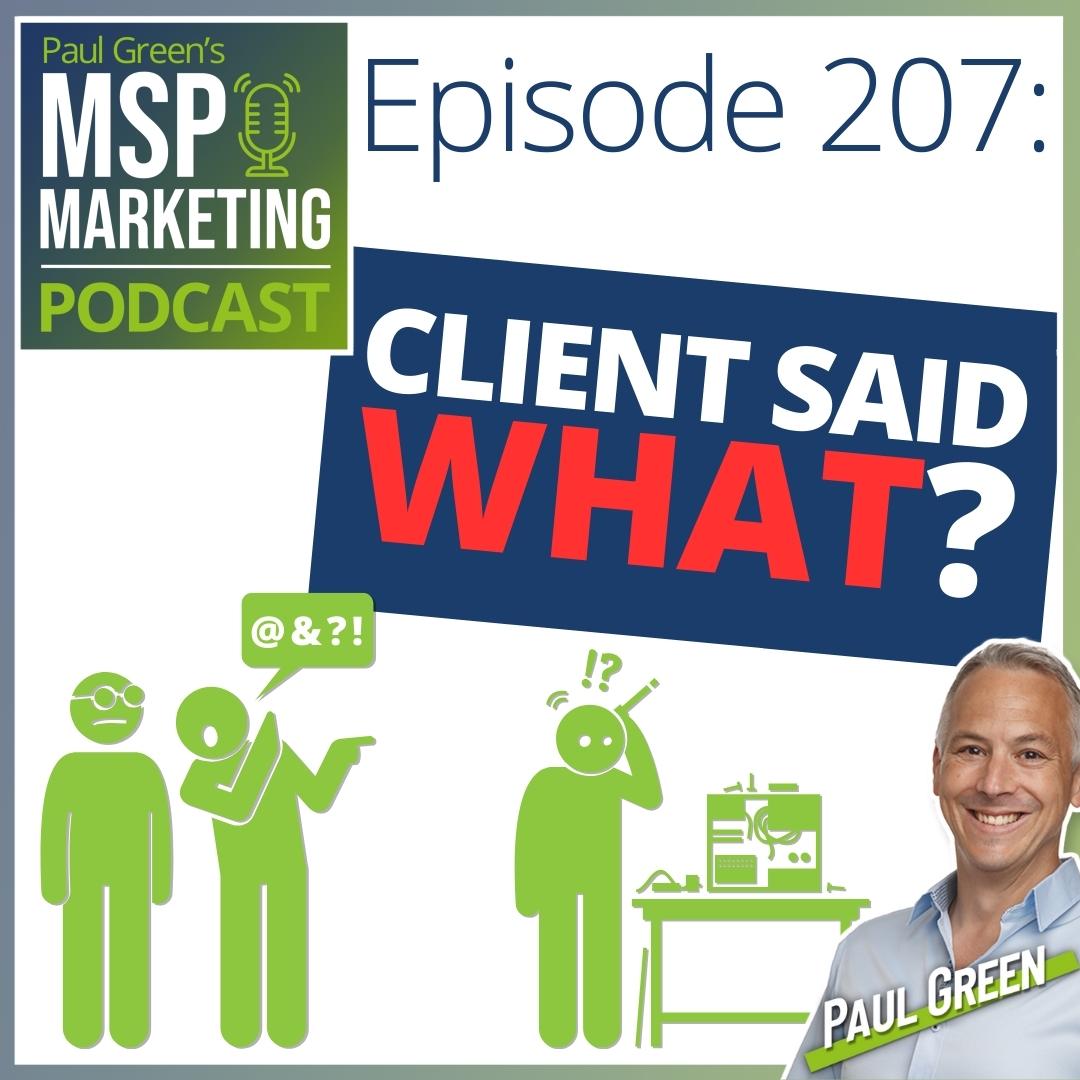
Episode 207 Welcome to the MSP Marketing Podcast with me, Paul Green. This is THE show if you want to grow your MSP. This...
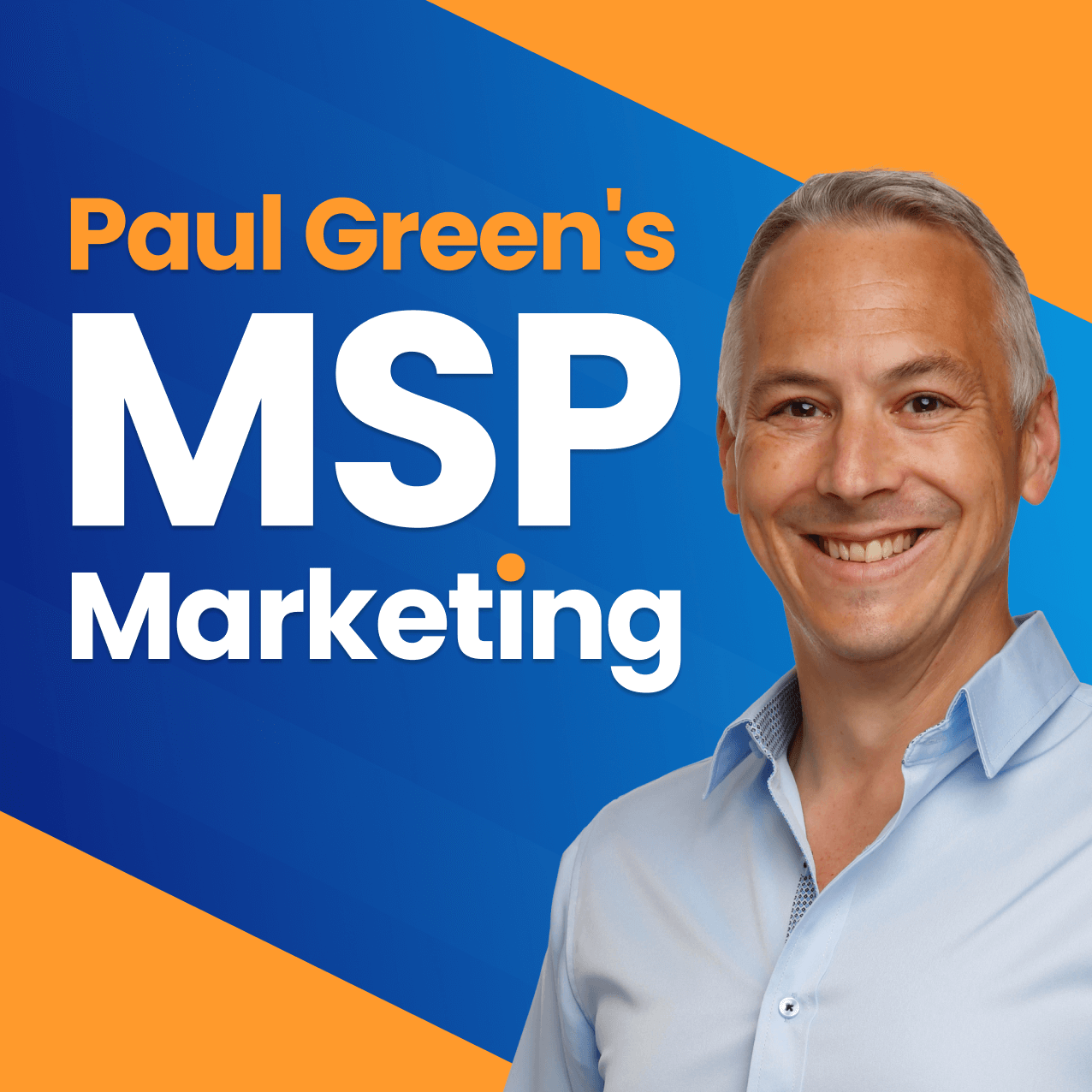
The podcast powered by the MSP Marketing Edge Welcome to this EASTER SPECIAL – Episode 284 of the MSP Marketing Podcast with me, Paul...
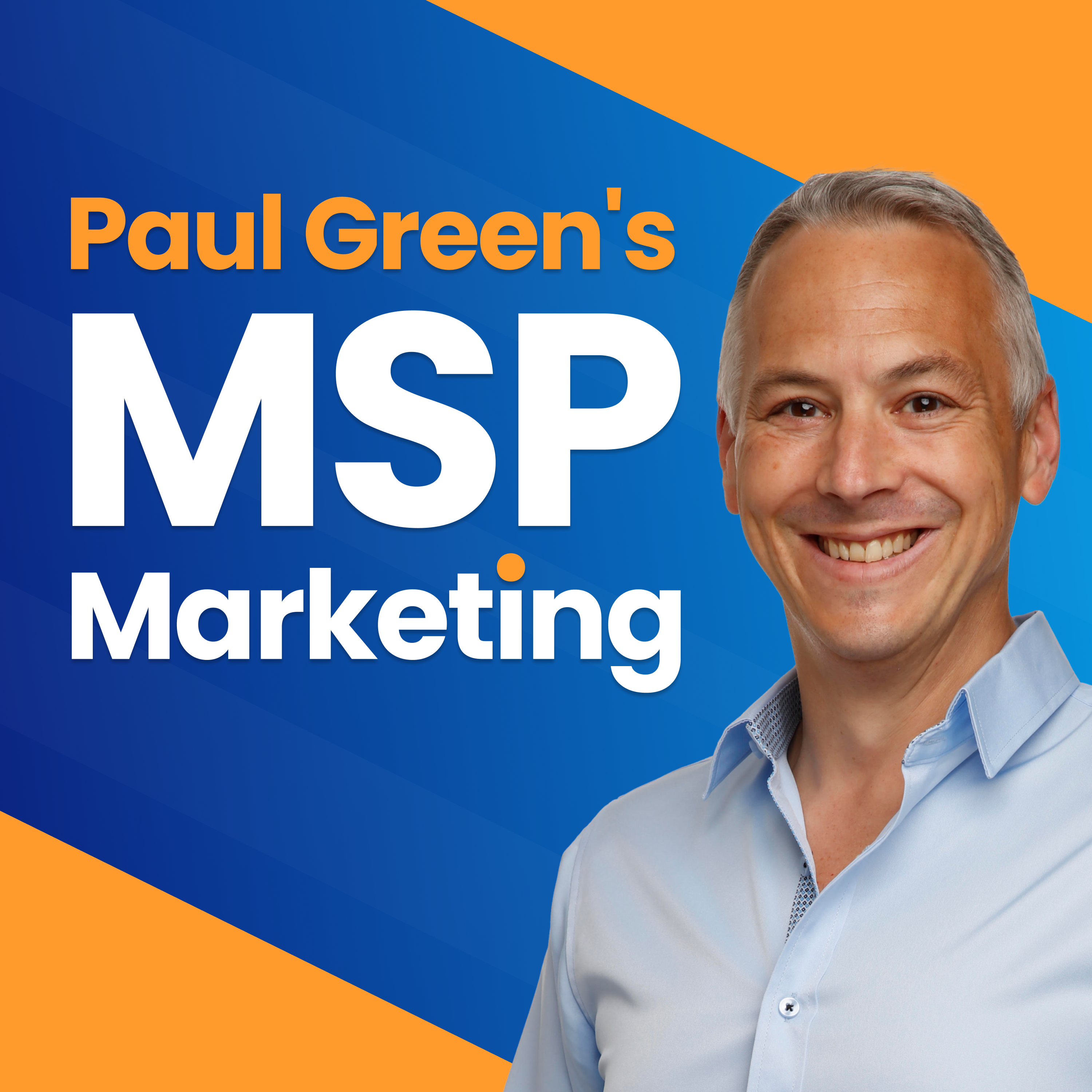
In this week’s episode One day you’ll want to sell your MSP. It might be years away, but it’s a good habit to start...